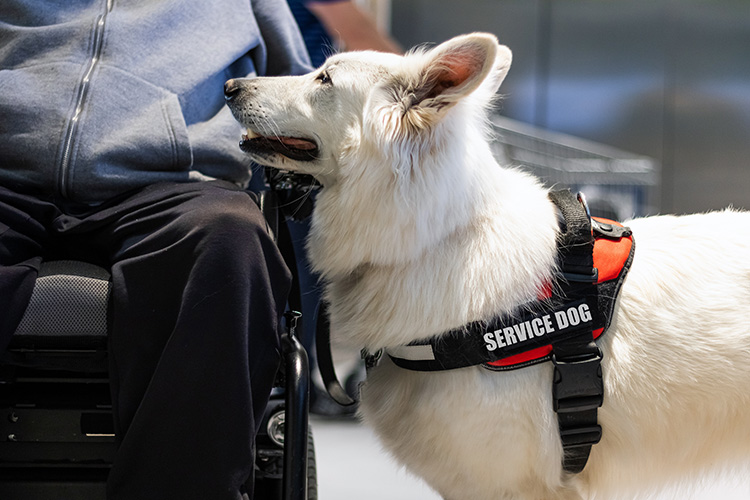Psychiatric service dogs are rising in popularity and have been proven to benefit those struggling with mental health issues. Many people who have emotional support animals have realized that they qualify to register them as psychiatric service dogs.
Psychiatric service dogs are dogs that are specially trained to perform a specific task which aides a person with a mental health disability. To qualify for one, you must get a medical professional’s approval and prove that the dog performs a task that is directly related to your mental health issue. Here is a list of tasks that psychiatric service dogs commonly perform to help you evaluate if your dog may be qualified.
Applying Deep Pressure Therapy
If an individual is having a panic attack, the dog can stand on top of the individual and apply their weight to specific pressure points to help the person calm down.
Reminding to Take Medications
Someone with depression or anxiety may need help remembering to take their medication. A service dog can remind them to take their medication or even bring their medication bottle to them when they need it.
Interrupting PTSD Episodes
If an individual is having a flashback or PTSD episode, the dog can interrupt it by climbing onto the person, licking them, nudging them, or distracting them.
Stopping Self-Harming Behavior
A psychiatric service dog can be trained to interrupt self-harming behaviors by getting in the way, pulling at the individual’s hand, or doing other distracting behaviors.
Create a Barrier Against Potential Danger
Someone with anxiety or PTSD may feel threatened by other people or situations. A service dog can stand in between the person and the perceived threat, creating a safety barrier.
Bringing Water or Other Item
A service dog can be trained to bring water, food, medication, or comfort items to someone who is paralyzed by a panic attack in order to help them recover.
Help Lead Someone Experiencing Dissociation
If an individual is experiencing severe dissociation, they may find themselves lost in a crowd, or wandering confused, feeling detached from reality. The service animal can help guide them to a safe location or the nearest exit to help them recover.
Alerting Handler to Anxious Repetitive Behavior
Someone with OCD or anxiety may have a repetitive behavior or something they obsess over, which a service animal can interrupt and help stop.
Help Stabilize and Balance Handler During Panic Attack
If their handler has a panic attack or flashback, they may feel dizzy and faint. Their service dog can give them something to lean on to help them regain balance and control.
Provide Reality Check
For individuals struggling with schizophrenia or other illness that causes hallucination, a service dog can help them determine if what they are seeing or hearing is real or not.
Help Waking Up
If an individual is struggling with nightmares or has difficulty getting out of bed every day, a dog can be trained to wake them up.
There are many other tasks a psychiatric service dog can perform that are not on this list. The number of potential tasks is endless and can be customized to the needs of the individual. If you have an emotional support animal that is performing any of these tasks or other tasks related to your mental health, then you may qualify to register them as a psychiatric service dog. Contact our experts at United Support Animals to see if you qualify today!




